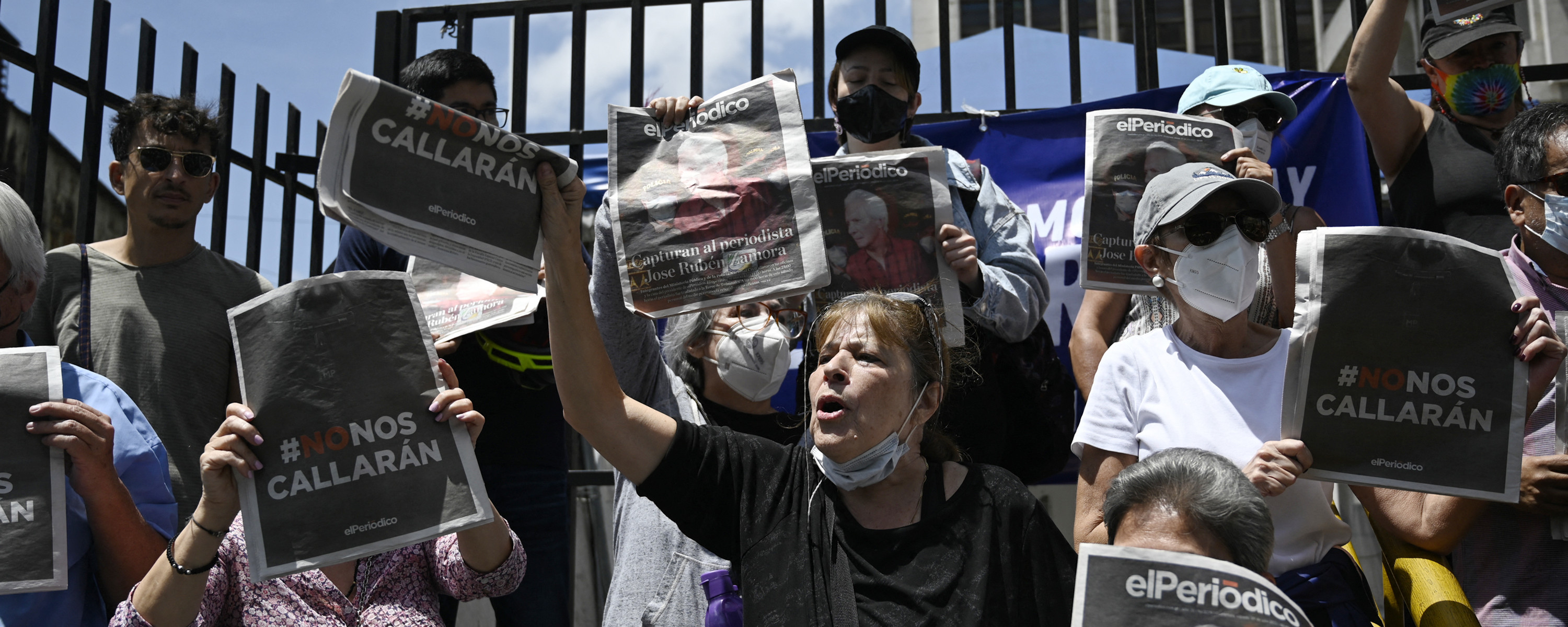On February 28, reporter Alex Valdéz was covering a hearing for Guatemalan publisher José Rubén Zamora, in jail since July on charges of money laundering and obstruction of justice, when lead prosecutor Cinthia Monterroso accused him, five more journalists, and three columnists of trying to “coerce the court” with their writing on the Zamora story.
She asked the court to probe “the financing sources [of Zamora’s elPeriódico] because everything must be orchestrated by… [pause] more people.” She accused the journalists of “investigating, perhaps illegally, judges and prosecutors, following them to their houses” and recommended that the court uncover “who gave them the order and organizations who finance them.”
The judge then ordered the investigation. Valdéz was standing feet away from the bench.
“The prosecutor’s attitude was quite surprising. (...) She alluded to publications signed by me and other colleagues,” Valdéz told El Faro English. “My articles were published with rigor and contrast of information in elPeriódico, where I worked until just a few weeks ago.”
Gerson Ortiz, a former elPeriódico editor also named, noted: 'When press organizations met with the Attorney General on Wednesday [March 1], she responded that they have no lines of investigation into journalists, but that they can't ignore a judge's order. That’s what makes me think it’s a systemic persecution,' Ortiz said.
He also mentioned that Guatemalan netcenters, or alleged troll farms, attacked the journalists mentioned in the hearing in the preceding days. Ortiz considered it a hint of things to come, as the accounts usually leak information related to targets of the Public Prosecutor’s Office. In the last two years, those same netcenters threatened several anti-corruption prosecutors and judges just days before arrest warrants were issued.
'I don't think there's any national institution left for us to turn to,' Ortiz said, referring to the co-optation of the Guatemalan justice system by corrupt actors in recent years.
The newly accused include op-ed writers Édgar Gutiérrez, a former foreign minister; Manfredo Marroquín, head of the local chapter of Transparency International; and Gonzalo Marroquín, an ex-president of the Inter-American Press Association.
They have been annexed to the case against Zamora, who has even been forced to change counsel under the threat of arrest of his attorneys in a process plagued with irregularities that has drawn sweeping international condemnations.
The judge who ordered the probes, Jimi Bremer, is the same who annulled the arrest warrant in December for a formerly fugitive Constitutional Court magistrate sanctioned by the U.S. State Department for his implication in a prolific 2020 court-stacking case.
Guilt by (little to no) association
The U.N. Human Rights Office voiced “concern” over the order and Guatemalan journalists filed a report with the Inter-American Commission for Human Rights. Press advocates including the Committee to Protect Journalists also issued expected condemnations.
But who most rankled Guatemalan authorities was the U.S. State Department, which wrote: “We urge the Guatemalan justice system to reject the criminalization of independent journalists and support independent journalism.” Assistant Secretary of State Brian Nichols added, “Democracies defend freedom, including that of expression.”
The Foreign Ministry called Nichols’ statement an “attack on sovereignty”; the human rights ombudsman wrote that “every judicial process is carried out with respect for fundamental rights”; the Public Prosecutor’s Office bristled: “Issuing loose opinions without knowledge is irresponsible. […] There is no criminalization of journalism or free thinking here.”
Prosecutor Monterroso’s words, though, leave little room for doubt: “There could exist, thinking in the abstract, other outlets who call themselves independent and receive the same financing,” she said. Guatemalan journalists called this a threat to press freedom.
Like neighbors Nicaragua and El Salvador, for two years the Guatemalan government has looked to clamp down on the finances of civil society critics and the press under the guise of curbing money laundering and foreign interference.
Nicaragua used a 2020 “foreign agents law” to shutter news outlets and NGOs and convict presidential candidate Cristiana Chamorro of money laundering. The government grabbed at the fact that the foundation she led had offered journalism workshops to mount the same allegations against outlet Confidencial, where her brother Carlos Fernando Chamorro is director.
The Confidencial newsroom has been occupied by the military for more than four years. Cristiana, Carlos Fernando Chamorro, and over 300 other Nicaraguans were stripped of their citizenship in the past month by the Ortega regime.
In El Salvador, Nayib Bukele’s party proposed its own foreign agents law in November 2021 to impose arbitrary registration and a 40 percent tax on any international funding to NGOs and most of the independent media. Decried domestically and shunned by the diplomatic corps, the party paused the initiative but said last August that it is still on the table.
In June 2020 the Guatemalan Congress took a similar step, approving the “NGO Law” that enables the Ministry of Governance to cancel the legal status of NGOs without due process, monitor day-to-day financial operations, and intervene in their activities “when public order requires it.” Many independent outlets in the country are registered as NGOs.
The government has yet to wield the law, which drew the condemnations of hundreds of Guatemalan civil society groups but, a year later, was upheld by the Constitutional Court.
“While Ortega and Bukele do everything in their power to guarantee that their human rights violations are known by the world,” stated Juan Pappier of Human Rights Watch, “their neighbor Giammattei is progressively and silently destroying Guatemalan democracy hand-in-hand with corrupt actors.”
*Additional reporting from Julie López
Correction at 9:30 a.m. on March 6: Prosecutor Monterroso accused the journalists and columnists of following judges and prosecutors to their home. This article first stated that the prosecutor recommended that authorities follow them to their home.
This article first appeared in the March 6 edition of the El Faro English newsletter. Subscribe here to tune into Central America.

